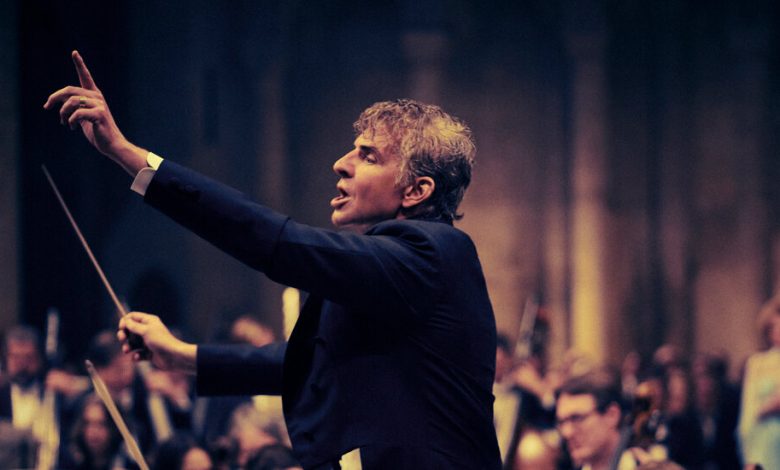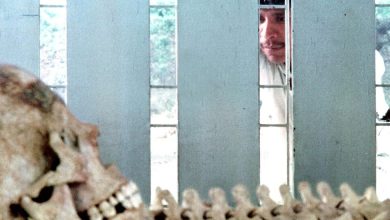Conducting Lessons: How Bradley Cooper Became Leonard Bernstein

On a late-spring day in 2018, when the New York Philharmonic was deep in rehearsals of a Strauss symphony, an unexpected visitor showed up at the stage door of David Geffen Hall, the Philharmonic’s home.
Listen to This Article
Listen to this story in the New York Times Audio app on iOS.
The visitor, Bradley Cooper, the actor and director, had come on a mission. He was preparing to direct and star in a film about Leonard Bernstein, the eminent conductor and composer who led the Philharmonic from 1958 to 1969. He was asking the orchestra’s leaders for help with the movie, “Maestro,” which has its North American premiere on Monday at the New York Film Festival.
The Philharmonic is accustomed to having luminaries at its concerts. But it was unusual for someone like Cooper to express such deep interest in classical music, a field often neglected in popular culture.
“How many top Hollywood stars can be genuine or interested in that way?” said Deborah Borda, the Philharmonic’s then-president and chief executive. “We were really impressed.”
Soon, Cooper was a regular at the Philharmonic’s concerts and rehearsals, sitting in the conductor’s box in the second tier and peppering musicians with questions. He visited the orchestra’s archives to examine Bernstein’s scores and batons. And he joined Philharmonic staff members on a trip to Green-Wood Cemetery in Brooklyn, placing a stone on Bernstein’s grave, a Jewish rite.
“You could see that he was watching with a very special eye,” said Jaap van Zweden, the Philharmonic’s music director. “He wanted to get into Bernstein’s soul.”
Cooper’s time with the Philharmonic was the beginning of an intense five-year period in which he immersed himself in classical music to portray Bernstein, the most influential American maestro of the 20th century and a composer of renown, whose works include not just “West Side Story” but music for the concert hall.
He attended dozens of rehearsals and performances in New York, Los Angeles, Philadelphia, Berlin and at Tanglewood in Massachusetts. And he befriended top maestros, including van Zweden; Michael Tilson Thomas, a protégé of Bernstein who led the San Francisco Symphony; Gustavo Dudamel, who leads the Los Angeles Philharmonic; and Yannick Nézet-Séguin, the music director of the Metropolitan Opera and the Philadelphia Orchestra, who served as the film’s conducting consultant.
Cooper has portrayed musicians before: He took piano, guitar and voice lessons for his role as Jackson Maine, a folksy rock star, in the 2018 film “A Star Is Born,” which he also directed.
But “Maestro,” in theaters on Nov. 22 and on Netflix on Dec. 20, posed a new challenge. Bernstein was a larger-than-life figure with an exuberant style at the podium. Cooper needed to learn not only to conduct, but also to captivate and seduce like a great maestro.
Cooper watched archival footage of Bernstein conducting, and Nézet-Séguin recorded dozens of videos on his phone in which he conducted in Bernstein’s manner. He also sent play-by-play voice-overs of Bernstein’s performances and assisted Cooper on set, sometimes guiding his conducting through an earpiece.
Nézet-Séguin said the biggest challenge for Cooper, as for many maestros, was “feeling unprotected” and “naked emotionally” on the podium. “He wouldn’t settle for anything less than what he had in mind.”

Cooper with Yannick Nézet-Séguin at Ely Cathedral, in England, where Nézet-Séguin coached Cooper for the film’s re-creation of a performance of Mahler’s “Resurrection” Symphony with the London Symphony Orchestra.Credit…Netflix
Cooper, who wrote “Maestro” with Josh Singer, declined to comment for this article because he belongs to the union representing striking actors, which has forbidden its members from promoting studio films. But in a discussion last year with Cate Blanchett, who played the fictional maestro Lydia Tár in “Tár” (2022), he described conducting as “the most terrifying thing I’ve ever experienced.”
He said that people often ask: “What does a conductor even do? Aren’t you just up there doing this?” He waved his arms.
“My answer is it’s the absolute hardest thing you could possibly ever want to do,” he said. “It is impossible.”
Cooper grew up near Philadelphia surrounded by music. He played the double bass and showed an interest in conducting, inspired by portrayals of mischievous maestros in “Looney Tunes” and “Tom and Jerry” cartoons. When he was 8, he asked Santa for a baton.
“I was obsessed with conducting classical music,” he told Stephen Colbert on the “Late Show” last year. “You know you put your 10,000 hours in for something you never do? I did it for conducting.”
Steven Spielberg, who had been planning to direct “Maestro,” was aware of Cooper’s obsession. He recalled Cooper telling him that “he’d conduct whatever came out of their hi-fi system at home.”
After a screening of “A Star Is Born,” Spielberg was so impressed that he decided to hand “Maestro” over to Cooper, with whom he shares a love of classical music.
“It only took me 15 minutes to realize this brilliant actor is equaled only by his skills as a filmmaker,” said Spielberg, who produced the film, along with Cooper and Martin Scorsese.
Cooper worked to win the trust of the Bernstein family, including his children, Jamie, Alexander and Nina, who gave the film permission to use their father’s music. (“Maestro” beat out a rival Bernstein project by the actor Jake Gyllenhaal.)
Jamie Bernstein said that Cooper seemed “keen to seek an essential authenticity about the story.” He asked questions about her relationship with her father, and he was adept at imitating his gestures, like placing his hand on his hip as he conducted.
Cooper visited the family home in Fairfield, Conn., admiring a Steinway piano that Bernstein used to play and examining his belongings: a bathrobe, a blue-striped djellaba, a bottle of German cough syrup that he brought back from a foreign tour.
“He was just like a sponge soaking up every detail about our family’s existence that he possibly could,” she said.
Cooper sent photos of himself in makeup and costumes, holding replicas of Bernstein’s batons, to his children. (They defended him recently when he drew criticism for wearing a large prosthetic nose in his portrayal of Bernstein, who was Jewish.)
At the gym, Cooper sometimes wore a shirt emblazoned with the words “Hunky Brute,” a nickname that Bernstein used for the New York Philharmonic’s brass players. (Bernstein also wore a version of the shirt.)
Bernstein’s musical career unfolds in the background in “Maestro”; much of the film focuses on his conflicted identity, including his marriage to the actress Felicia Montealegre (Carey Mulligan) and his dalliances with men.
Cooper was eager to approach “Maestro” less as a biography and more as the story of a marriage, Spielberg recalled.
While Cooper understood Bernstein’s genius, Spielberg said, he also had “an understanding of the complexities of Felicia’s love for this man, whom she would certainly have to share not only with the world but also with his hungry heart.”
The film, shot largely on location, recreates several moments from Bernstein’s career, including his celebrated 1943 debut with the New York Philharmonic, when he filled in at the last minute for the ailing conductor Bruno Walter at Carnegie Hall.
At Tanglewood, the Boston Symphony Orchestra’s summer home in the Berkshires, Cooper’s Bernstein is shown leading master classes and driving a sports car with the license plate MAESTRO1 across a pristine lawn as the real Bernstein had done. He visits his mentor, the Russian conductor and composer Serge Koussevitzky, who suggests he change his surname to Burns to avoid discrimination.
In his conducting studies, Cooper spent the most time with Dudamel and Nézet-Séguin. He visited Walt Disney Concert Hall in Los Angeles, dressed and made up as Bernstein, for sessions with Dudamel. And he traveled to Germany, score in hand, to observe Dudamel as he rehearsed Mahler’s “Resurrection” Symphony with the Berlin Philharmonic. (Dudamel declined to comment because he is also a member of the actors’ union.)
Cooper stealthily watched Nézet-Séguin from the orchestra pit at the Met, including at a 2019 performance of Debussy’s “Pelléas et Mélisande.” Later that year, for Bernstein’s 100th birthday, Nézet-Séguin invited Cooper and Mulligan to narrate a staging of Bernstein’s operetta “Candide” with the Philadelphia Orchestra.
Nézet-Séguin said he didn’t set out to give Cooper conducting lessons but to refine his portrayals. “I had to take what he already did as an actor,” he said, “and make it into a frame that was believable.”
Nézet-Séguin, who also conducts the film’s soundtrack, helped him find the downbeat for Schumann’s “Manfred” overture, which opened the Carnegie program in 1943. And he assisted Cooper with dialogue for a rehearsal scene of “Candide,” during which he conducts with a cigarette in his mouth.
Last fall, Cooper and Nézet-Séguin traveled to Ely Cathedral in England to recreate a 1973 performance of Mahler’s “Resurrection” Symphony by Bernstein and the London Symphony Orchestra, a climactic moment in the film.
Cooper, who chose the music in “Maestro,” had studied the piece intensely, watching Bernstein’s performance as well as videos in which Nézet-Séguin dissected Bernstein’s gestures and explained how to count beats.
“He would watch the videos,” Nézet-Séguin said, “and then text me and say, ‘Hey, can we talk about this or that moment?”
Inside an empty Ely Cathedral, Nézet-Séguin, wearing a sweater that had belonged to Bernstein, coached Cooper as he rehearsed an eight-minute section of the piece with a recording.
When the London Symphony Orchestra arrived, Cooper watched as Nézet-Séguin rehearsed in the style of Bernstein, who often broke the rules of conducting with his animated gestures. Sometimes, Cooper offered suggestions, such as adding tremolo in the strings.
When Cooper took the podium, Nézet-Séguin provided occasional direction through an earpiece, advising him to hold onto a moment or let go.
The musicians of the London Symphony Orchestra were startled by Cooper’s transformation. “It was uncanny,” said Sarah Quinn, a violinist in the orchestra. “It was just kind of a double take.”
Throughout his work on “Maestro,” Cooper maintained a connection to the New York Philharmonic, soliciting stories about Bernstein. Van Zweden, who worked with Bernstein in Amsterdam in the 1980s, told him how Bernstein had broken protocol and hugged Queen Beatrix of the Netherlands, calling her “darling” and taking a sip of his drink at the same time.
Cooper visited Geffen Hall last fall after its $550 million renovation, attending a rehearsal of Beethoven’s Ninth Symphony and flipping through a Mahler score that had belonged to Bernstein. He returned in February when Dudamel was introduced as the Philharmonic’s next music director, embracing him and admiring a photo of Bernstein.
Over the summer, Cooper invited a few Philharmonic staff members and musicians to his Greenwich Village townhouse for screenings of “Maestro.” The orchestra presented him with a gift: a replica of Bernstein’s Carnegie debut program.
“From the beginning, he was intent on avoiding a broad burlesque of a personality, especially one as big as Bernstein’s,” said Carter Brey, the orchestra’s principal cellist, who attended a screening.
Cooper has compared playing Bernstein to “channeling a supernova.” He said in a recorded Zoom conversation with Jamie Bernstein last year that her father transmitted his soul through conducting.
“The pilot light never went out with him, which is incredible given everything that he saw, experienced, understood, comprehended, bore witness to, even within his own self,” he said in the video. “What a person. What a spirit.”
Audio produced by Tally Abecassis.




